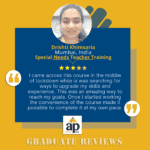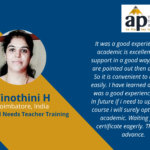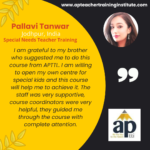Diploma in Special Education: For Inclusive Teaching
In today’s open school system, a Diploma in Special Education is one of the most important credentials for teachers to have. As people learn more about different learning needs, schools and other organizations are looking for teachers who are trained to help students with Special Educational Needs. This diploma gives teachers the skills, knowledge, and resources they need to help all students, even those with challenges. If you want to be a teacher or are already one, getting this credential can help your job and classroom performance in a big way. Let’s talk about how this training can help you become a better teacher.
Table of content
- How do I get a Diploma in Special Education?
- Why is training in special education important?
- How does it help your job as a teacher?
- Who would like to get this diploma?
- What Are You Going to Learn?
- Online vs. Offline Programs for Special Education
- SEN Certificate vs. Diploma in Special Education
- What role do courses for students with special needs play?
- Is it Possible to Get a Degree in Special Educational Needs?
- What to Expect from Training for Students with Special Needs
- How to Pick the Best Course
- In conclusion
- FAQs
How do I get a Diploma in Special Education?
A Diploma in Special Education is a professional training school for teachers that teaches them how to help kids who have problems learning, behaving, or physically. This diploma uses a mix of individualized teaching methods, inclusive teaching methods, and psychology theories to help all students do well.
Why is training in special education important?
You have the right to special education, not just the need for it. Giving teachers the skills to spot and meet a range of students’ learning needs makes sure that every student, no matter how smart they are, has a fair chance. Courses on special educational needs teach you the skills you need to run inclusive classes and give each student a personalized learning experience.
How does it help your job as a teacher?
Teachers who have a diploma in special education have an advantage in the job market. This credential shows that you are ready to help students from different backgrounds, whether you want to work in public schools, foreign institutions, or inclusive classrooms. It also gives people the chance to lead in special education areas.
Who would like to get this diploma?
Anyone who wants to make a change in the world of education should take this course. It will be very helpful for teachers in regular or inclusive schools, shadow teachers, special educators, and education experts. This path can also be used by professionals who want to move into the area of special educational needs training.
What Are You Going to Learn?
The course usually covers topics such as child psychology, inclusive teaching methods, strategies for addressing behavior problems, and techniques for adapting the curriculum. You will also learn how to work with parents and other workers and figure out what a child’s special needs are. Case studies and practical tasks are also common in many programs.
Online vs. Offline Programs for Special Education
For many working teachers, flexibility is very important. You can study at your own pace and in the comfort of your own home with special educational needs online classes. All of these programs cover the same things, and many of them include virtual tests and mentor help.
SEN Certificate vs. Diploma in Special Education
With the SEN Certificate, students learn about the basics of special needs education in a shorter, more basic program. Beginners should be able to do it. But a diploma goes into more detail and covers a wider range of topics, such as advanced teaching methods, case management, and theories of child development.
What role do courses for students with special needs play?
Courses for students with special needs are what make open education work. They help teachers understand the wide range of learning gaps that exist, such as those caused by autism, ADHD, dyslexia, and emotional problems. When teachers take these classes, they learn how to make sure that every child feels understood and supported in the classroom.
Is it Possible to Get a Degree in Special Educational Needs?
Yes, teachers can get a degree in special educational needs to learn even more. Research, practical practice, and theoretical study are all common parts of degree programs. A diploma will help you do well in the classroom, but a degree could lead to jobs in education policy or teaching.
What to Expect from Training for Students with Special Needs
Modules on learning issues, communication problems, changing the curriculum, and individualized education plans (IEPs) are common parts of training for people with special educational needs. You’ll learn both the “why” and “how” of special education, which will help you make your classroom welcoming, fun, and helpful for everyone.
How to Pick the Best Course
Check to see if the course will help you reach your goals before you sign up. Look for up-to-date training materials, experienced teachers, a variety of ways to learn, and certification that is recognized. Think about how well the school prepares you for teaching in the real world and for ongoing professional development.
In conclusion
A Diploma in Special Education is more than just a certificate—it’s a title that can help teachers advance in their careers and give them the tools they need to change lives. You will grow as a teacher and become a source of support for kids with different needs if you use inclusive practices and get specialized training. As the world works to make sure everyone has the same chances to learn, trained special educators are very helpful in every school.
FAQ
1. What kinds of jobs are available after getting a certificate in special education?
In both regular and special schools, you can work as an inclusive classroom teacher, a special educator, a shadow teacher, or an educational advisor.
2. Does having a SEN certificate mean I can work in special education?
An SEN Certificate is a good place to start, but a diploma will give you more in-depth information and more job options.
3. Can I work and get my education at the same time?
Yes, a lot of online classes for students with special educational needs are made for working adults who need flexible study times.
4. What kinds of kids will I learn how to help?
Your skills will allow you to work with kids who have learning difficulties, ADHD, autism, behavior problems, and other unique needs.
Five. How long does it take to finish the diploma?
Duration of courses varies by program, but most diplomas take between 6 months and a year to complete, based on how they are studied.













